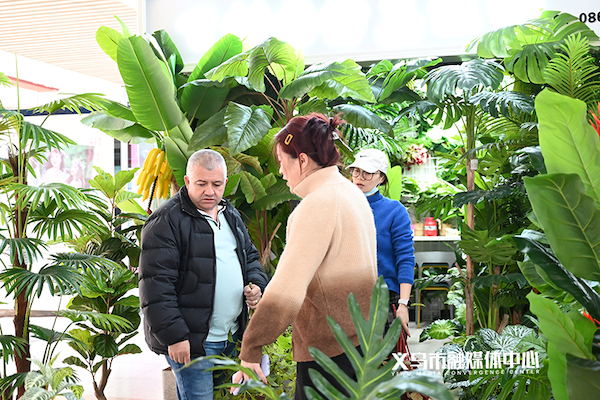New bright spots shine in pressured trade scene

Workers prepare a Yiwu-Xinjiang-Europe route China-Europe freight train for departure in Yiwu, Zhejiang province, on March 1. The train is scheduled to arrive in Paris after March 20. [HU XIAOFEI/FOR CHINA DAILY]
Bai Ming, a researcher at the Beijing-based Chinese Academy of International Trade and Economic Cooperation, underscored the importance of the "new three" in driving high-quality development, contrasting them with the more traditional "old three" industries of furniture, clothing and home appliances.
Citing the case of Yiwu, home to the world's largest wholesale market for small manufactured goods, he said it needs to seek new growth opportunities and speed up the upgrade and transformation of manufacturing and foreign trade, offering more high-quality and high-value products for the target markets.
"Regardless of whether engaging in foreign trade or domestic sales, lacking a distinct brand makes survival in this fiercely competitive market a challenge. Branding is the way forward," said toys exporter Chen Meijun, who moved into Yiwu International Trade Market to start her business in 2002.
As of today, Chen said her team has forged partnerships with over 500 domestic manufacturers, supplying various types of toys across the globe, mainly to emerging markets such as the Middle East and South America.
"When I moved into the Yiwu market over 20 years ago, only 5 percent of the market's businesses engaged in foreign trade. After years of development, over 80 percent of the business operators here are doing foreign trade business," she said.
Bai from the CAITEC said it is advisable for exporters to embrace digital technologies to better tap into the target markets and then offer new quality products in demand.
"We need to build new advantages in foreign trade with more efforts to promote technologies, improve the product quality and services, and build our own brands," he said.
China has adopted policies and measures for improving the structure of foreign trade while keeping its scale stable. China's foreign trade reached a record high of 6.61 trillion yuan in the first two months of the year, up 8.7 percent year-on-year and signaling a strong start for 2024, according to the General Administration of Customs.
During the period, China's foreign trade continued the positive trend that began in the fourth quarter of last year, achieving year-on-year growth for five consecutive months. Exports of certain products like automobiles, home appliances and ships saw significant increases, said Lyu Daliang, director of the GAC's Department of Statistics and Analysis.
As for the composition of exports, GAC data showed that electromechanical products constituted nearly 60 percent during the January-February period, with automatic data processing equipment, integrated circuits and automobile exports recording substantial growth rates.
In addition to witnessing a growing trade volume with major trade partners like the Association of Southeast Asian Nations, the United States and South Korea in the first two months, China's foreign trade with other economies participating in the Belt and Road Initiative amounted to 3.13 trillion yuan, up 9 percent year-on-year, according to GAC data.
Experts said the better-than-expected results were driven by factors including the rapid growth in emerging markets and acceleration in the development of "new quality productive forces", which became key buzzwords during this year's two sessions.
According to the latest Government Work Report, the country will move faster to develop new quality productive forces.
The report noted that while facing new difficulties from a more complicated external environment, the country still enjoys favorable conditions and factors to stabilize foreign trade and investment, including its continued efforts to expand high-standard opening-up, its enormous market and complete industrial chains, and its bilateral and multilateral economic and trade cooperation with BRI countries.

 Yiwu and Qingtian: Global supermarket alliance spurs economic growth
Yiwu and Qingtian: Global supermarket alliance spurs economic growth Artificial flowers: Yiwu's evergreen business
Artificial flowers: Yiwu's evergreen business Yiwu Intl Trade Market reopens after Spring Festival holiday
Yiwu Intl Trade Market reopens after Spring Festival holiday